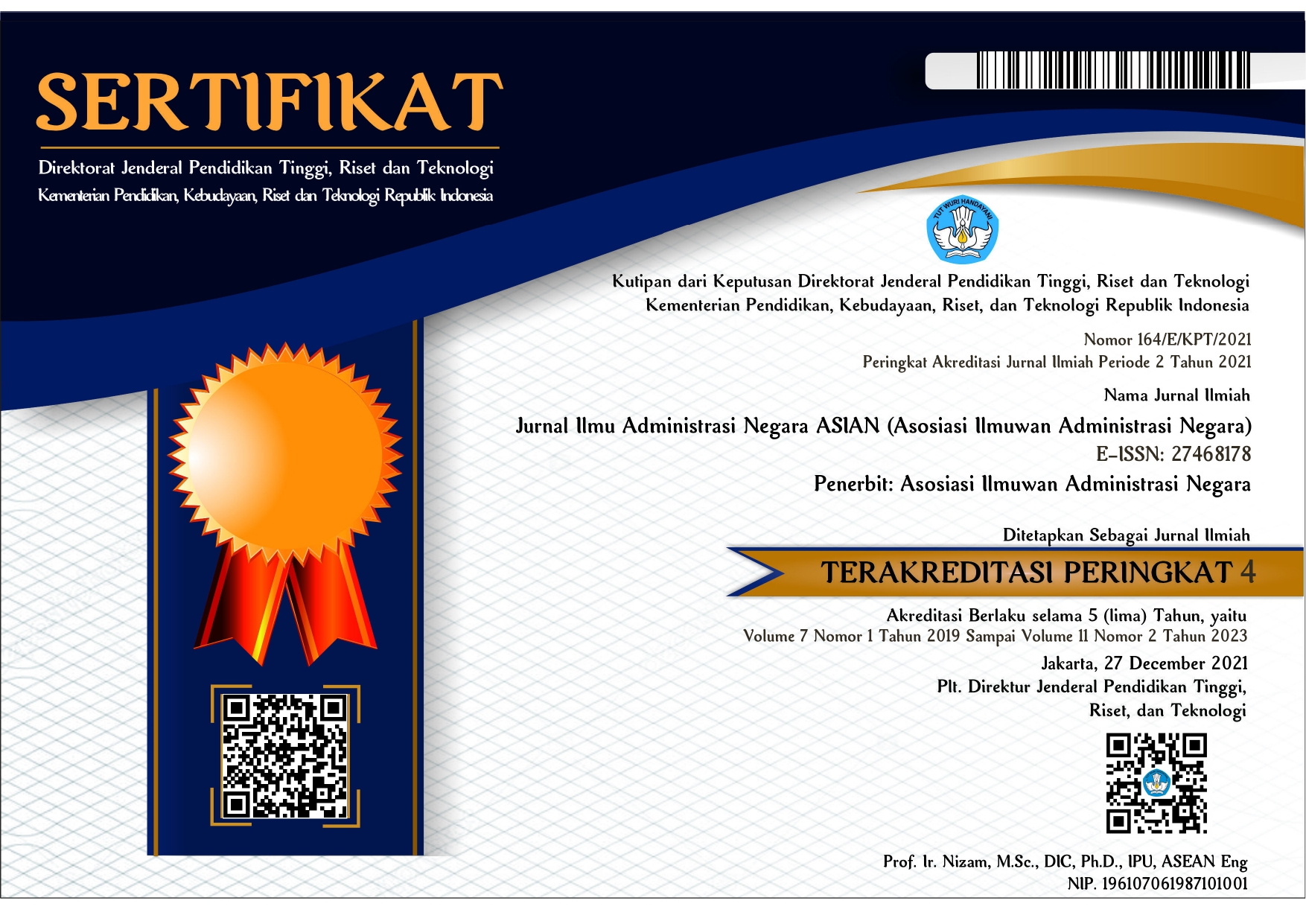Studi Implementasi Program Kota Tanpa Kumuh (KOTAKU) di Desa Sokaraja Kidul
 Abstract views: 901
,
Abstract views: 901
,
 PDF downloads: 1540
PDF downloads: 1540
Abstract
Kota Tanpa Kumuh (KOTAKU) program is national program to increase infrastructure acces and basic service in urban slum area. Desa Sokaraja Kidul is one of the areas implementing KOTAKU program. The purpose of this research is to find out how the implementation of KOTAKU program at Desa Sokaraja Kidul using What’s Happening perspective by Ripley and Franklin. This research is using qualitative descriptive method. The results of this study indicate that the Implementation of Program KOTAKU (KOTAKU) in Desa Sokaraja Kidul based on dimensions in the perspective of What’s Happening by Ripley and Franklin hasn’t optimal. The following results of the research based on the perspective dimensions of What’s Happening: 1) The Profusion of actors, found that the role of actors at the community level such as BKM and KSM has not been optimal. 2) The Multiplicity and vagueness of goals, The purpose of the KOTAKU Program are understandable and implementing actors understand the program's purposes. 3) The Poliferatin and complexity of government programs, coordination and communication have been effective, policy changes that occur but didn’t have significant impact on the program implementation, Guidelines for program implementation have been made but actors at the community level are not aware of the guidance, the sustainability step in the implementation procedure has not optimally implemented. 4) Community Participation, the people of Desa Sokaraja Kidul support and participate in the implementation of the program. 5) Influencing factors, the funds allocated have not been able to solve all slum problems and social and cultural conditions are factors driving implementation while economic conditions are becoming obstacles to implementation.
Downloads
References
Aji Ratna Kusuma, Santi Rande & Sahria Aprilliana. (2018). Partisipasi
Masyarakat dalam Pelaksanaan Program Kota Tanpa Kumuh (Kotaku)
(Studi Tentang Program Pembangunan Drainase dan Sanitasi di
Kelurahan Teritip Kota Balikpapan). eJurnal Administrasi Negara, Volume 6, Nomor 1: 7034-7048
Dijan Rahajuni dkk. 2017. Pengembangan Kelompok Swadaya Masyarakat (Ksm) Ekonomi Pnpm-Mandiri Perkotaan Pasca Program Studi Kasus Di Kabupaten Banyumas.
Easton, David. 1953 The Political System.New York. Knopf
Hessel Nogi S. Tangkilisan, M.Si, Drs, 2003. Kebijakan Publik yang Membumi, Konsep, Strategi dan Kasus, Yogyakarta: Lukman Offset dan YPAPI.
Hogwood, Brian W, and Lewis A. Gunn, 1986, Policy Analysis for the Real World, Oxford University Press.
Kusumanegara, Solahuddin.2010. Model Dan Aktor Dalam Proses Kebijakan Publik. Yogtakarta. Gava Media.
Moleong, Lexy J. 2015. Metodologi Penelitian Kualitatif. Bandung. PT Remaja Rosdakarya.
Nakamura, Robert T and FrankSmallwood. 1980. The Politics of Policy Implementation, St. Martin Press, New York.
Ripley, Rendal B. and Grace A.Franklin, 1986. Policy Implementation and Bureaucracy, second edition, the Dorsey Press, Chicago-Illionis. Grindle (1980)
Sri Yuliani dan Gusty Putri Dhini Rosyida. (2017). Kolaborasi Dalam
Perencanaan Program Kota Tanpa Kumuh (Kotaku) di Kelurahan
Semanggi Kota Surakarta. Jurnal Wacana Publik, Volume 1, Nomor 2:
33-47
Sudarmo. 2011. Isu-isu Administrasi Publik dalam Perspektif Governance. Solo: SmartMedia
Sugiyono. 2005. Memahami Penelitian Kualitatif. Bandung : Alfabeta.
Tauhid. (2017). Implementasi Kebijakan dan Revitalisasi Kota Tanpa Kumuh
Neigborhood Upgrading and Shelter Sector Project (NUSSP) di Kota Bima.
Jurnal Administrasi Negara, Volume 14, Nomor 3: 118-133
Wibawa, Samodra. 2002. Evaluasi Kebijakan Publik. Raja Grafindo Persada: Jakarta.
Copyright (c) 2020 Jurnal Ilmu Administrasi Negara ASIAN (Asosiasi Ilmuwan Administrasi Negara)

This work is licensed under a Creative Commons Attribution-ShareAlike 4.0 International License.
Authors who publish with this journal agree to the following terms:
1. Copyright on any article is retained by the author(s).
2. The author grants the journal, right of first publication with the work simultaneously licensed under a Creative Commons Attribution License that allows others to share the work with an acknowledgment of the work’s authorship and initial publication in this journal.
3. Authors are able to enter into separate, additional contractual arrangements for the non-exclusive distribution of the journal’s published version of the work (e.g., post it to an institutional repository or publish it in a book), with an acknowledgment of its initial publication in this journal.
4. Authors are permitted and encouraged to post their work online (e.g., in institutional repositories or on their website) prior to and during the submission process, as it can lead to productive exchanges, as well as earlier and greater citation of published work.
5. The article and any associated published material is distributed under the Creative Commons Attribution-ShareAlike 4.0 International License









